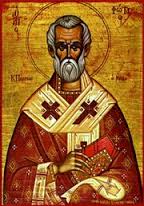Some people like to read a biblical passage every day. Me, I like to look up the Wikipedia listing of what happened on that day over the past whatever many years.
It turns out on this day in 869 “The Fourth Council of Constantinople is convened to decide about what to do about patriarch Photius of Constantinople.”
I had to dig a bit deeper into this one.
Turns out Photius was a late medieval humanist who while still a layman was elected Patriarch of Constantinople. It appears the controversies over his leadership marked the end of a common acceptance of ecumenical councils between the East and the West, establishing that seven that most everyone walking down the street is aware of…
Wikipedia gives this assessment of his life and work.
“Photios is one of the most famous figures not only of 9th-century Byzantium but of the entire history of the Byzantine Empire. One of the most learned men of his age, he has earned his fame due to his part in ecclesiastical conflicts, and also for his intellect and literary works. Analyzing his intellectual work, Tatakes regards Photios as ‘mind turned more to practice than to theory’. He believes that, thanks to Photios, humanism was added to Orthodoxy as a basic element of the national consciousness of the Byzantines. Tatakes also argues that, having understood this national consciousness, Photios emerged as a defender of the Greek nation and its spiritual independence in his debates with the Western Church. Adrian Fortescue regards him as ‘the most wonderful man of all the Middle Ages’, and stresses that ‘had not given his name to the great schism, he would always be remembered as the greatest scholar of his time.'”
Not a bad epitaph…













